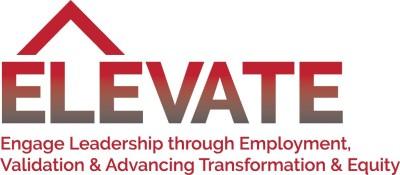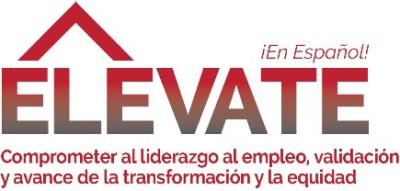The purpose of the ELEVATE program is to build the capacity of persons with HIV (PWH) to be meaningfully involved in the planning, delivering, and improving of Ryan White HIV/AIDS Program (RWHAP) services. ELEVATE will consist of a five-day-training program. ELEVATE integrates core components of past HRSA programs to create one robust curriculum capable of supporting PWH in the HIV workforce and helping to improve the quality of care and services for people with HIV as well.
Virtual ELEVATE training Capacitación VIRTUAL ELEVATE en español- Day One: PWH Systems-Level Leadership
- The Ryan White HIV/AIDS Program
- National HIV/AIDS Strategy (revised as HIV National Strategic Plan)
- Structures of Involvement
- PWH Leadership
- Day Two: HIV Prevention, Care, & Treatment
- HIV 101 including PrEP, PEP, & TasP
- The HIV Life Cycle and Medications
- Adherence and Overcoming Barriers
- HIV and Co-Morbidities
- Social Determinants of Health
- Day Three: Public Health Tools & Skills
- Health Literacy
- Introduction to Data
- Data Terminology
- Performance Measurement
- Charts & Graphs
- Day Four: Program Track Breakout
- Planning Services
- Improving Services
- Delivering Services
- Day Five: Creating Change
- Communicating as Part of Team
- Facilitation Skills
- Managing Stigma and Trauma as PWH Leaders
- Personalized Action Plan based on Program Track
- Action Planning Report-Out
- Day 1 Objectives
- Introduce the Ryan White HIV/AIDS Program (RWHAP) and the Ryan White Legislation
- Describe the “parts” of the RWHAP
- Define and describe a “comprehensive system of HIV care”
- Compare and contrast agitation, activism, and advocacy as methods of involvement
- Explain the relationship between HIV activism and mandates for local control and governance
- List governance, advisory structures, and healthcare team roles where PLWH can seek involvement
- Identify the traits and characteristics of leaders
- Use self-assessment to critically think about areas for leadership development
- Day 2 Objectives
- Clear up misconceptions regarding how HIV is transmitted
- Provide a brief overview of HIV and AIDS facts
- Understand what PrEP (pre-exposure prophylaxis) is, who it is for, and how it is paid for
- Understand the concept of U=U (Undetectable = Untransmittable)
- Describe the stages of HIV replication using the mnemonic AFRITAB
- Brainstorm strategies that individuals engaged in (1) planning services, (2) improving services, or (3) delivering services can do to support Persons with HIV in adherence
- Day 3 Objectives
- Explain what health literacy means
- Recognize indications that your clients are experiencing limited health literacy
- Apply health literate approaches to improve communication with your clients
- Explain the importance of organizational health literacy for your clients
- Day 4 Objectives
- Define and describe a “comprehensive system of HIV care”
- Describe the shared responsibility of the PC/PB and recipients in establishing, maintaining, and improving the local system of care
- Identify ways service standards are used by consumers, subrecipients, PC/PBs, recipients, and Quality Managers
- Describe and compare the planning body member roles of advocate and planner
- Describe how the planning bodies use data to support community planning
- Define and describe Plan-Do-Study-Cycles in the context of HIV care
- Provide an example of a PDSA Cycle
- Review Policy Clarification Notice 15-02 on Clinical Quality Management
- Day 5 Objectives
- List types of stigmas and describe the impact of stigma on Persons with HIV
- Describe physical, emotional, and cognitive symptoms of trauma
- Define self-regulation and describe the value of self-regulation to PWH Leaders
- Peer sharing of methods to self-regulate when stigmatized or re-traumatized
- Participant development of individualized action plan tailored to ELEVATE program track
- Identify 1 key action step for Action Planning Report Out
- Peer sharing of key action steps for personal and/or professional development plans
At the end of each ELEVATE training, individuals will have the option to express interest in receiving post-training support through coaching sessions. In addition, trainers can also recommend participants for coaching based on observations during training. NMAC staff and Subject Matter Experts serve as a primary coach. Coaching sessions are 30 minutes each, although the first session is 60 minutes long. For the first three months of coaching, participants will attend once a month. After the first three months, participants will attend bi-monthly meetings.
ELEVATE’s coaching team will be composed of four NMAC staff with support from five SMEs to ensure high technical skills and cultural responsiveness. Coaches will be paired with graduates of ELEVATE in one-on-one relationships. Coaches will develop six-month coaching plans along criteria identified by coaches/participants at the initiation of the coaching. NMAC has available existing structures of dyadic coaching in BLOC, which will guide coaches/participants in developing achievable, successful, and sustained plans for action. All plans will specify an end point; if the end point is more than nine months from initiation, the coach and participant will provide a report at three months to ELEVATE leadership at NMAC. The plans will be provided to evaluators for monitoring and process evaluation.
The coaching program will focus on performance enhancement, employment advancement, and the assumption of leadership in RWHAPs and planning bodies. Coaching plans will foster the identification of participant needs and how they collaborate to resolve challenges/needs. Plans will help address skills and barriers to participation, inclusion, and communication. Coaching on motivational interviewing and supporting PWH of Color in predominately white organizations are examples of skills that will address barriers to participation and inclusion of PWH leadership the workforce.
ELEVATE is supported by the Health Resources and Services Administration (HRSA) of the U.S. Department of Health and Human Services (HHS) as part of a financial assistance award totaling $796,749.00 with 100 percentage funded by HRSA/HHS. The contents are those of the author(s) and do not necessarily represent the official views of, nor an endorsement, by HRSA/HHS, or the U.S. Government.

